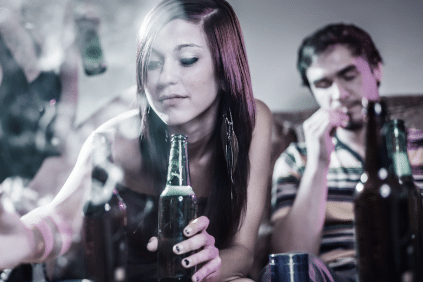Does marijuana use cause car accidents in Washington?
Driving while under the influence of alcohol or drugs is a leading factor in many fatal car accidents in Washington State—and the situation hasn’t been improved by recreational marijuana legalization, according to a new study. In fact, DUI crashes now account for almost half of all traffic fatalities in the state and represent a significant increased risk to public health.
Our law firm is concerned about safety on Washington roads. In this blog, we explore the recent findings around people who drive drunk and high and outline your options if you were hurt by one of these reckless drivers.

Drivers who use alcohol and weed take more risks and cause more accidents
A recent survey conducted by AAA found that people who use both alcohol and marijuana are some of the biggest risk-takers on Washington roadways. People driving drunk and high are more likely to speed, text, intentionally run red lights, and drive aggressively than those who don’t, AAA says.
In fact, Washington State Patrol, the Seattle Police, and other local departments have seen a lot more people driving on marijuana and alcohol since the legalization of marijuana in 2012. Plus, a Washington Roadside Survey found that nearly 1 out of 5 daytime drivers may be under the influence of marijuana.
Now, nearly a decade after marijuana legalization, the most common drug involved in fatal car crashes isn’t one drug at all, but a combination of multiple substances. “Poly-drug drivers” (people driving under the influence of a combination of multiple drugs or alcohol) are involved in about 40% of Washington fatal crashes.
A look at the stats: driving while drunk and high
The AAA study compared people who drive on marijuana and alcohol with people who drive on alcohol only to determine whether mixing weed with booze changes behavior behind the wheel.
The self-reported study asked people in the two groups (as well as sober drivers) whether they had engaged in the following risky behaviors:
- - Speeding on residential streets: 55% of marijuana-alcohol influenced drivers confessed to speeding, compared to 35% of drunk drivers.
- - Aggressive driving: 52% of drivers on weed and booze admitted aggressive driving habits, compared to 28% of the alcohol-only influenced drivers.
- - Intentionally running red lights: 48% of weed-alcohol drivers and 32% of alcohol-only drivers acknowledged they ran a red light.
- - Texting while driving: 40% of drunk-high drivers and 21% of drunk drivers admitted to reading or sending a text while behind the wheel.
People who drive sober said they drove recklessly much less often. The risk sober drivers took most often was driving while drowsy.
How does marijuana use affect driving ability?
It’s a common misconception that driving while under the influence of marijuana is perfectly safe. This just isn’t the case. Several studies, including one published in 2016 by the Society for the Study of Addiction, demonstrate a statistically significant increase in crash risk among marijuana users.
Tetrahydrocannabinol (THC), the chemical component of marijuana responsible for the psychoactive effects, has been shown to impair driving ability in several notable ways:
- - Impaired judgement
- - Impaired coordination
- - Impaired concentration
- - Reduced reaction time
The higher the THC levels in the bloodstream, the greater the risk of a motor vehicle accident.
In short: driving under the influence of marijuana may be “safer” than drunk driving according to some metrics, but it is by no means safe.
Marijuana DUI laws in Washington State: what you need to know
Accidents caused by drivers impaired by marijuana can be some of the most difficult to investigate. With recreational marijuana legalization being fairly new, there is still a lot of debate about how high is too high to drive. To make matters more complicated, a 100% reliable way to detect the level of cannabis impairment has not yet been developed. Plus, detectable amounts of THC can linger in the bloodstream for hours or even days after drug use, so even if someone is perfectly sober, they would still test positive for THC.
That being said, Washington is ahead of many states when it comes to detecting marijuana consumption and setting limits.
Washington is one of a handful of states that has set a legal limit for THC in the blood stream, which is currently at 5 ng/ml for drivers over the age 21. If you are under 21, it is illegal to drive if any THC can be detected in your blood. Tests require a blood draw and are typically performed either at a medical facility or police station.
Our state is also one that trusts the Drug Recognition Expert program, which trains law enforcement officers to recognize impairment from various drugs.
Injured by a drunk or high driver? Tilt the odds in your favor with a car accident lawyer
If you were severely injured or a loved one died in a vehicle crash caused by a drunk driver, a high driver, or someone who was drunk and high at the same time, you can seek compensation for your damages under Washington State law.
While you may be entitled to compensation for your current and future medical bills, lost wages, loss of earning capacity, your pain and suffering, and other applicable damages, don't expect the at-fault driver’s insurance company to just hand over the money you deserve without a fight.
You can’t count on insurance companies to do the right thing because ultimately, they have a financial incentive to pay you as little money as possible—if anything at all. That's why it's common for insurance adjusters to purposefully delay, dispute or straight-up deny valid injury claims. And if they do make you a settlement offer, insurance adjusters almost always lowball you in the beginning.
Hiring an experienced attorney who understand complex drugged driving cases and can stand up to the insurance company tilts the odds in your favor.
The Zach Herschensohn team knows how to make insurance companies take claims involving impaired drivers seriously
When the insurance companies try to reject or minimize payouts to people injured by drunk and high drivers, or other reckless people, our law firm hits them back with evidence-based arguments that are hard to ignore. Investigating impaired driving accidents can be complicated, but getting justice for people injured by such reckless, preventable behavior is our passion.
Don't leave money on the table. Let a Kent car accident lawyer aggressively advocate for your best interests and fight for every dollar you deserve.
Contact us today for a free consultation. Our office is located in Kent, and we proudly serve clients throughout the Seattle Metro area and King County.
References
Washington State Patrol. DUI / Impaired Driving.
Washington Traffic Safety Commission. Impaired Driving.
Washington State Liquor and Cannabis Board. Safety.
National Highway Traffic Safety Administration (NHTSA). Drug-Impaired Driving.
The content provided here is for informational purposes only and should not be construed as legal advice on any subject.

